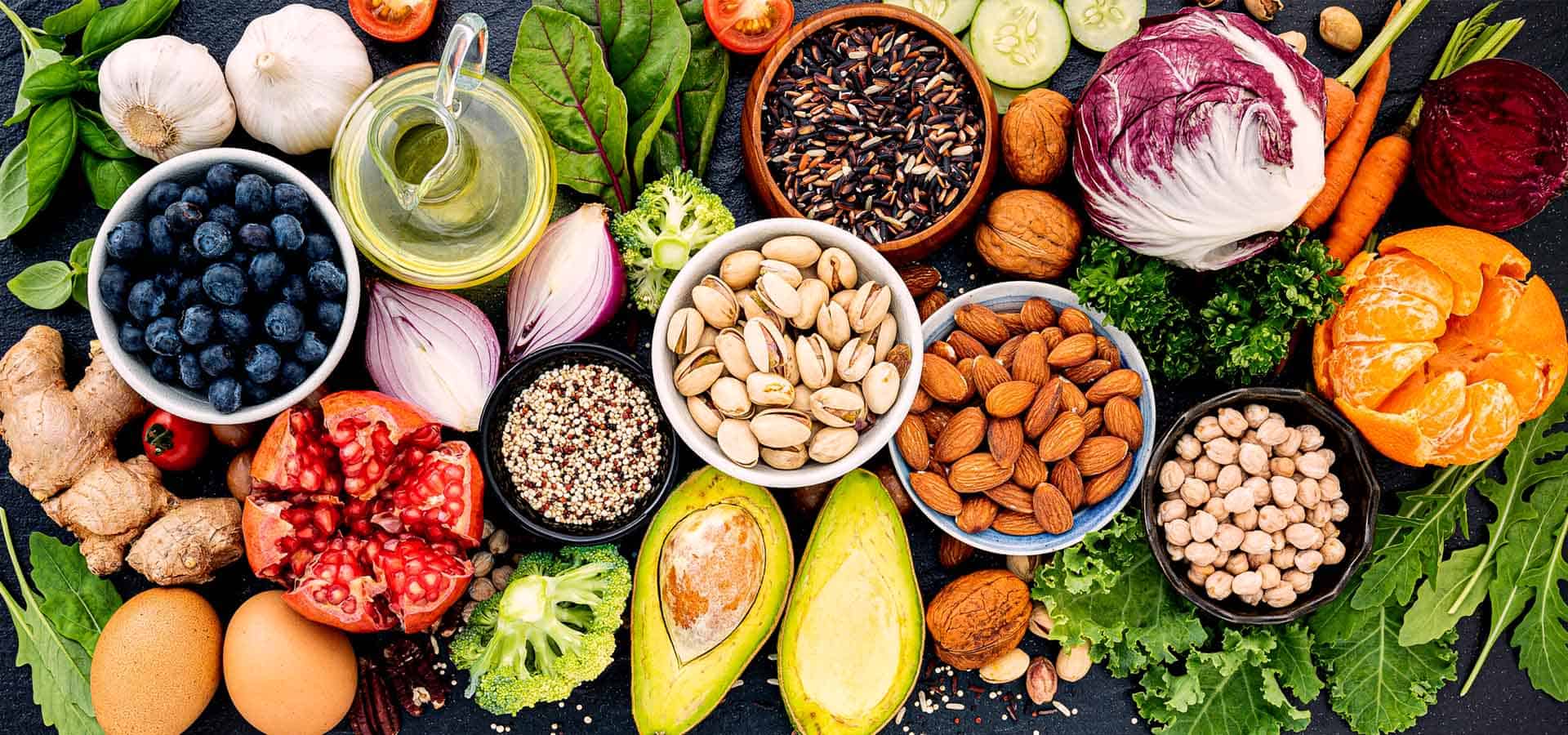
Food Safety During Pregnancy
June 8, 2021
Easy Chicken Tacos
August 16, 2021I’ve been wanting to write about gut health for a while now, since it has become such an important and popular topic.
T here is SO much that we could cover when it comes to our gastrointestinal health and nutrition, but I thought I’d start with a general overview on how food and lifestyle factors play a role in our gut health and how we feel each day.

What is gut health? Why is it important?
Our gut, also known as our gastrointestinal or digestive tract, is a very complex system that breaks down and absorbs the nutrients that we eat and gets rid of waste products. It starts in the mouth and includes your esophagus, stomach, small intestine, large intestine, rectum, and lastly, the anus. The liver, pancreas, and gall bladder also play a role in digestion along the way.
Not only does our gut digest food, but it also helps communicate information about our hormone levels and general health to our brain and is a major part of our immune system. Close to 70% of our immune system is found in our gut as this is where our body encounters many pathogens. In addition to the main and accessory organs, there are trillions of bacteria, archaea, and fungi that live in our digestive tract, this is called our gut microbiome. These living organisms help with digestion, influence your immune system, and affect your central nervous system. They also produce key vitamins and short chain fatty acids, which further benefit our gut health. Our overall gut health and ecosystem of microorganisms are influenced by many factors such as lifestyle, stress and anxiety, nutritional factors, medications, infection, and disease. There is still a lot we don’t know about the gut and the microorganisms that live there, but we are learning more and more each day.
What are signs that your gut may not be in the best health?
A healthy gut will tolerate a variety of foods, feel full and experience slight bloating after eating, produce and pass gasses often throughout the day, and have regular, soft, easy-to-pass, formed bowel movements. When you experience symptoms that interfere with your quality of life or ability to eat, that is when it may be time to determine the root cause and incorporate strategies to improve your gut health.
Signs that your gut health may be less-than-optimal include:
- Abdominal pain
- Abdominal cramping
- Excessive gas
- Heartburn or acid reflux
- Abdominal distention or excessive bloating
- Diarrhea or constipation
- Low energy/fatigue
- Nausea or vomiting
- Blood in your stool
- Urgency to use the washroom
- Micronutrient abnormalities (e.g., low iron, vitamin B12)
- Irritability, anxiety, or sudden mood changes
7 STEPS TO IMPROVE YOUR GUT HEALTH
While digestive symptoms can be frustrating, there are many things that can be done to manage or greatly reduce your symptoms.
1. Get a proper diagnosis and DO NOT self-diagnose
There are many serious conditions that can cause some of the above symptoms, so it is very important that you do not self-diagnose, use online testing kits, or start eliminating foods from your diet to try to determine what’s going on with your body. Always speak to your medical doctor first so that they can conduct the right tests and/or refer you to a gastroenterologist to rule out conditions such as inflammatory bowel disease (Crohn’s disease or ulcerative colitis), celiac disease, digestive cancers, or irritable bowel syndrome (IBS).


2. Optimize meal timing
Developing a consistent and regular eating schedule can really help manage and reduce gastrointestinal symptoms. Your intestines have a wave of muscle contractions that help to flush through any residual food about every 90 minutes throughout the day. This is called the Migrating Motor Complex (MMC). This sweep will not occur if you are actively eating. This means that eating too frequently throughout the day (i.e. grazing) can prevent your body's MMC from occurring between meals and can result in a build-up of food residues that may contribute to bloating. Instead, we recommend leaving at least 2 hours between meals and snacks, and focus on getting enough protein, fat and fibre in the meal so that you can stay adequately full/satisfied until then.
Try to have something to eat within the first 1-2 hours of waking up as your body has gone all night without any fuel. This will break your fast from overnight and give you the energy you need to start your day. Waiting too long to eat in the morning can result in increased hunger later in the afternoon and/or feelings of nausea. After your first meal, try to have a meal or snack every 3-4 hours throughout the day, this will keep your metabolism and energy levels up, keep your blood sugar levels stable, ensure you are getting enough nutrients throughout the day, and prevent you from being overly hungry at the next meal/snack which can result in eating very quickly and/or overeating.
3. Get enough fibre each day
Fibre is a type of carbohydrate that is not broken down or digested by the body and passes through the digestive system. As it passes through our system, it has quite a few benefits to our overall health:
- Helps to keep us full for longer after a meal
- Slows the digestion and absorption of sugars from our meal, keeping our blood sugar levels (and energy levels) more stable after we eat
- Some types of fibre feed the wide range of bacteria and other microorganisms that live in your intestinal tract, these are called pre-biotic fibres. They help to create a diverse and healthy ecosystem of microorganisms in your gut. Some examples of food rich in prebiotics include lentils, beans, oatmeal, onions, bananas, asparagus, and wheat bran.
- Add bulk to your stool so that your intestines can push the food along in a timely manner, helping to prevent constipation
- Acts as a gel to bind the food residue together and trap water to keep things soft and intact, helping to prevent diarrhea
- Traps cholesterol in the intestine and pulls it out of the body, helping to lower cholesterol levels
Fibre can be found in many plant-based foods, such as fruits, vegetables, legumes, nuts, seeds, and whole grains. We should aim to have 25-38 grams of fibre per day.

4. Incorporate stress-management strategies into your routine
Your gastrointestinal tract has its very own nervous system, called the enteric nervous system. It directs all the functions of your gut. This is how your central nervous system (brain and spinal cord) and the gut speak to one another. Some evidence shows that the microorganisms in your gut play a role in the messages sent to your brain.
Just as the health of your gut can impact the messages sent to your brain and may play a role in our mood and cognition, our mood and cognition can play a role in how our gut responds to food. For example, stress and anxiety can have a large impact on how we digest and feel after a meal.
Developing and practicing stress and anxiety management strategies, sometimes with the support of a professional, can play a role in reducing unwanted gastrointestinal symptoms. In addition, engaging in mindful eating, where you are in a relaxed setting and able to take your time while eating, can help promote gut health and good digestion. One strategy can be to take five deep breaths or do a body scan meditation where you take a moment to focus on each part of your body and be in tune with how you are feeling before starting to eat, rather than rushing into it.
5. Incorporate a variety of foods in your diet
When we experience unwanted digestive symptoms, it can be tempting to try to pinpoint which foods make us feel unwell and begin eliminating them from our diet. However, the more foods we restrict, the least varied our diet becomes. Our digestive tract and the microorganisms in it thrive on being exposed to a wide range of food and fibres. The more diverse our diet, particularly in plant-based foods, the more diverse our ecosystem of bacteria.
6. Incorporate probiotics into your diet
Probiotics may help increase the number of good bacteria in the gut. Probiotic-rich foods include yogurt, kefir, kimchi, miso, kombucha, sourdough bread, and some cheeses. While the research on taking probiotic supplements for general gut health is inconclusive, there is good evidence that certain strains can be beneficial for certain digestive conditions, for example Bifidobacterium longum 35624 has been shown to reduce symptoms of irritable bowel syndrome. Speak to your health care provider about which probiotic strains may be helpful for you.
7. Consume foods rich in polyphenols
Polyphenols are plant compounds that have a variety of health benefits, including reduction in blood pressure, inflammation, and cholesterol levels. Polyphenols have been shown to be poorly absorbed and therefore are left to be food for the gut bacteria in the colon. Polyphenol-rich foods include dark chocolate, red wine, grapes, green tea, almonds, or broccoli.
Your gut is a very important and complex component of your health, and it’s worthwhile to keep it healthy. By eating a varied diet, rich in plant-based and fermented foods, reducing stress, limiting alcohol, and more, we can improve our gut health and hopefully reduce or eliminate unwanted symptoms associated with poor gut health. If you’re looking to improve your gut health and aren’t sure what first steps to take, work with a Registered Dietitian today!
Written by Tamara Smallwood and Liz Powell, RD.
References:
- Finney, K. (2019). What is 'gut health' and why is it important? UC Davis Health. https://health.ucdavis.edu/health-news/newsroom/what-is-gut-health-and-why-is-it-important/2019/07.
- Gagliardi, A., Totino, V., Cacciotti, F., Iebba, V., Neroni, B., Bonfiglio, G., Trancassini, M., Passariello, C., Pantanella, F., & Schippa, S. (2018, August 7). Rebuilding the Gut Microbiota Ecosystem. International journal of environmental research and public health. https://www.ncbi.nlm.nih.gov/pmc/articles/PMC6121872/.
- Lawrence, K., & Hyde, J. (2017, June 14). Microbiome restoration diet improves digestion, cognition and physical and emotional wellbeing. PloS one. https://www.ncbi.nlm.nih.gov/pmc/articles/PMC5470704/.
- Patino, E. (2020, June 9). Signs of an Unhealthy Gut and What You Can Do About It: Everyday Health. EverydayHealth.com. https://www.everydayhealth.com/digestive-health/signs-of-unhealthy-gut-and-how-to-fix-it/.





